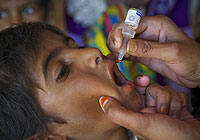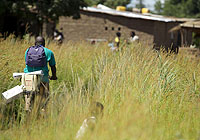Immunization
UNICEF plans major expansion of global vaccine programme
By Chris Niles
NEW YORK, USA, 3 January 2012 – UNICEF is preparing ambitious plans to update, strengthen and vastly expand its global vaccination programme.
| VIDEO: 15 November 2011: UNICEF correspondent Chris Niles reports on UNICEF's plans to expand its vaccination programme. Watch in RealPlayer |
Vaccination has always been at the heart of UNICEF’s mission. Protecting children from life-threatening diseases is one of the most effective ways to ensure they have the chance to reach their full potential.
UNICEF is an influential part of the world vaccine market. In 2010, it supplied vaccines worth $757 million.
Nevertheless, it is taking a critical look at its role in immunization, and is gearing up to triple its capacity over the next five years.
“We need to strengthen what we do, so that the role that we and governments play in delivering immunization is much more solid,” said UNICEF Chief of Immunization Jos Vandelaer.
 |
| © UNICEF/NYHQ2011-0186/Zaidi |
| A boy receives a dose of oral polio vaccine in a camp for people displaced by flooding in Sindh Province, Pakistan. |
Bolstering existing systems
Immunization is a rapidly changing field. Existing vaccines are constantly being updated and new, and often more expensive, vaccines are continually introduced to the market. Vaccines have recently been developed for pneumonia and diarrhoea, and a vaccine against malaria is expected shortly.
But while scientific advances are constantly moving immunizations forward, the structures that disseminate vaccines haven’t been updated significantly in decades.
“The systems were built in the 1970s and haven’t changed much over time. This is the right moment to look at the existing systems and think about how can we do things better,” Dr. Vandelaer said.
UNICEF’s immunization programme draws together various aspects of public health programmes – from a monitoring and supply system to the storage and delivery of vaccines and the training of health workers.
“Immunization brings those together in a way that is simple but also very well established. It one of the programmes that has the farthest reach in public health,” said Dr. Vandelaer.
 |
| © UNICEF/NYHQ2011-0393/Asselin |
| Emmanuel Kalwazi brings an icebox of UNICEF-supplied vaccines to a village in Katanga Province, DR Congo. |
Bolstering this system will increase the programme’s reach even further.
Reaching the most vulnerable
Global health experts expect to declare victory very soon over one of the gravest enemies of children: polio. And this important milestone in children’s health will also provide an opportunity to improve UNICEF’s immunization programmes.
Constant vigilance will be required to ensure that polio does not return. At the same time, UNICEF will look again at how it can use the knowledge that has been accrued in the fight against polio to make its existing systems stronger.
A more effective and wide-reaching vaccination programme will also help UNICEF fulfil its commitment to reaching the most vulnerable.
“There are 20 per cent of children every year who don’t get immunized, they are usually among the poorest, the more marginalized,” Dr. Vandelaer said. “We can use this know-how to bring the vaccines to those children.”
Related links
Government of Japan aids polio eradication efforts in Afghanistan
In Ethiopia, pneumonia vaccine aims to reduce child deaths
Simultaneous measles and polio vaccination in DR Congo
The Global Immunization Vision and Strategy (GIVS)

